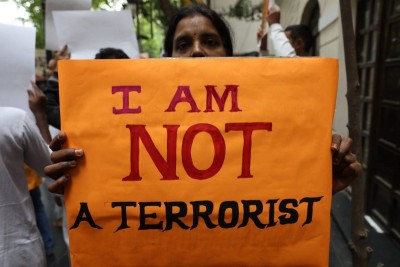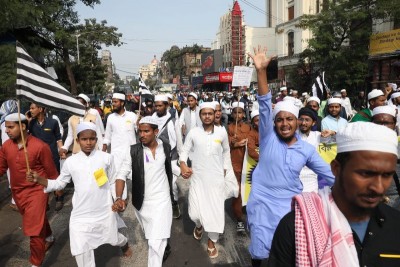
Communalism and Indian politics
Communalism is used in South Asia to denote attempts to promote primarily religious stereotypes between groups of people identified as different communities and to stimulate violence between those groups. In contemporary India, "communalism" designates not only the conflicts between extremist religious communities, but also those between peoples of the same religion but from different regions and states.
"We shall have India divided or we shall have India destroyed." This is what Jinnah had said in the course of India’s independence. And that happened.
From the beginning of independent India, ‘communalism’ is an integral part of the nation; as the very beginning of an independent India is division on the basis of religion.
The ongoing 16th Parliament election is a glaring example of communalism as the core of campaigning by several leaders, parties. On the eve of this election, Congress president Sonia Gandhi met Shahi Imam of Jama Masjid Syed Ahmed Bukhari to ask for his endorsement of Congress by urging the Muslims to vote for the party.
And the Imam obliged as he urged all Muslims across the country “to vote for Congress party all over the country and vote for Trinamool Congress in the state of West Bengal”. Here it’s important to mention that Trinamool Congress chief Mamta Banerjee shares good rapport with Mr. Bukhari as well. If media reports are true, so much so that when she missed an occasion at Bukhari’s, she at the next opportunity met him personally.
On other hand Mr. Narendra Modi and his Bhartiya Janta Party have been symbols of communalism in India for more than two decades and even in their political manifesto BJP speaks of the construction of a Ram Mandir at Ayodhya though the same has been tempered with a pledge to do so within the Constitutional framework. December 6th, 1992 is always referred as a black day in Indian history. On this day the disputed Babri masjid structure was demolished by the members of the saffron brigade. And BJP became a communal brand officially. Now the question arises why 1992 after more than 450 years since the construction of the mosque in 1527.
Now while BJP is branded communal, India’s so called all embracing Congress has been pilloried for surrendering to communal forces at the cost of being unfair to the fairer sex.
India’s youngest prime minister Rajiv Gandhi, who had started to build India with his modern views, unfortunately stopped to appease the religious minority. Well, we are referring to the Shah Bano case or the Mohd. Ahmed Khan v. Shah Bano Begum, the case of a controversial maintenance lawsuit in India. But even after winning the case at the Supreme Court of India the Muslim woman was denied alimony because the Indian Parliament reversed the judgement under pressure of Islamic orthodoxy. The judgement in favour of the woman in this case evoked criticisms among Muslims some of whom cited Qur'an to show that the judgement was in conflict with Islamic law. This case caused the Congress government, with its absolute majority, to pass the Muslim Women (Protection of Rights on Divorce) Act, 1986 which diluted the judgment of the Supreme Court and, in reality (reference missing), denied even utterly destitute Muslim divorcées the right to alimony from their former husbands.
The Shah Bano case once again spurred the debate on the Uniform Civil Code in India.
Ironically, the Hindu right wing led by parties like the Jan Sangh, which had strongly opposed reform of Hindu law in the 50's, in its metamorphosis as the Bharatiya Janata Party, became an advocate for secular laws across the board.
Rajiv Gandhi had also restored the balance by giving the Hindus something as well: he ordered the locks on the Ram Janmabhoomi Babri Masjid in Ayodhya removed. Until then, a priest had been permitted to perform puja once a year for the idols installed there in 1949. Now, all Hindus were given access to what they consider as the birthplace of Rama. And the result was all that we saw in 1992 with Babri demolition.
India faced two mass killing in recent history; one in 1984 in the anti-Sikh riots in the aftermath of the assassination of Indira Gandhi by her own Sikh bodyguards and another 2002 in Gujarat after the burning of Hindu kar sevaks in a train in Godhra. About 8000 human lives were lost in 1984 riots and about 1500 including missing diaries in post Godhra riots. Since 2% of voters in India are Sikh, the barbarity of anti-Sikh riots never got as highlighted as the atrocities on the Muslims. So as a result Gujarat riots got more attend till date and remained a big vote bank issue.
It’s not about Congress & BJP, all other national and regional parties also are part of the same game of Hindu Muslim. Delhi’s Jama Masjid Sahi Imam has vital role in Indian politics and it started in 1977 when he ruled against Congress and called the Muslims to vote for Janata Dal. In 2004, Lok Sabha polls, Bukhari reportedly had asked Muslims to support BJP; even though, he had slammed the same party in 2002 after Gujarat riots. It was later revealed, that his Brother Yahya Bukhari had forced him to support the party. He again opened his mouth in August 2011, when he asked Muslims not to support the Lokpal Bill & anti corruption movement by Anna Hazare agitation at Jantar Mantar. In 2012 UP assembly election the Shahi Imam urged Muslims to support the Samajwadi Party (SP) of Mulayam Singh Yadav, but unfortunately his son-in-law, Umar Ali Khan lost the assembly election. Now this year Bukhari called Muslims to vote for Congress across India and Trinamool Congress in West Bengal. But what is the reason behind such ruling, one has to wait to know it.
Trinamool Congress, a regional party of West Bengal created by Ms Mamta Banerjee in 1998 by splitting INC in Kolkata, started its debut with 8 seats in parliament along with BJP in 1999. In the comings days, Didi realized the vote bank of Muslims in West Bengal. Not surprisingly, Bukhari has appealed to Muslims to vote for Trinamool Congress in West Bengal.
Left front is also no other exception in India. They are unable to show gratitude to the freedom of a writer in 2007 when Indian army was called out on the streets of Kolkata when some minority groups enforced road blocks across the city and clashed with the police demanding immediate deportation of author Taslima Nasreen to Bangladesh. Crowds fought a pitched battle with the cops and threw stones at them. More than 150 cars were damaged and two buses were set on fire.
Now India is experiencing a new political party in the form of AAP (Aam Admi Party). Till now they have a different approach to issues but one has to wait to see if they can really rise above the Hindu-Muslim political game.
Here in India we are still unable to identify citizens as human; we identify them by their religion. Perhaps a secular India will remain a day dream forever.
(Views expressed in the article is of the author and not IBNS)
Support Our Journalism
We cannot do without you.. your contribution supports unbiased journalism
IBNS is not driven by any ism- not wokeism, not racism, not skewed secularism, not hyper right-wing or left liberal ideals, nor by any hardline religious beliefs or hyper nationalism. We want to serve you good old objective news, as they are. We do not judge or preach. We let people decide for themselves. We only try to present factual and well-sourced news.







